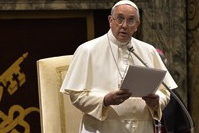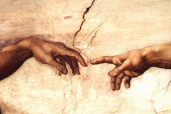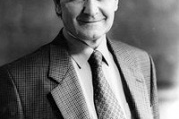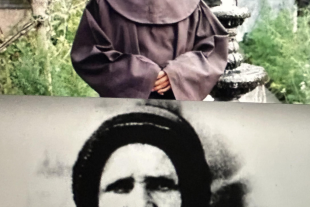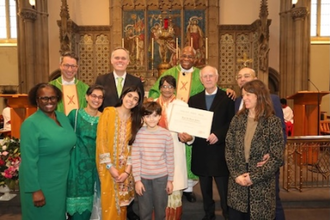Tributes to Stephen Hawking
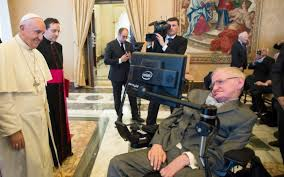
Pope Francis meets Hawking - screenshot
Source: Vatican News Service/ICN
The world-renowned scientist and author Stephen Hawking died on Wednesday, at his home in Cambridge, where he had spent his career studying the mysteries of the universe.
Hawking was diagnosed at 21 with motor neurone disease and given two years to live, but he did not let his increasing disability stop his work. Despite ending up totally immobile, confined to a wheelchair and speaking through a voice synthesizer, Hawking gained international renown for his ground breaking work on black holes and the theory of relativity and became the most famous face in the scientific world. His formidable mind probed the limits of human understanding, both in the vastness of space and in the sub-molecular world of quantum theory, which he said could predict what happens at the beginning and end of time.
As well as being a brilliant scientist, he also wrote about his ideas in a language that people could understand. He shot to international fame after the 1988 publication of his best-selling book 'A Brief History of Time'.
In 2014, Eddie Redmayne portrayed him in the film, 'The Theory of Everything; which explored his early life as a student and the onset of his debilitating disease.
Stephen Hawking met with four popes in the Vatican. In November 2016 he met Pope Francis during a session of the Pontifical Academy of Sciences exploring the impact of scientific knowledge and technology on people and the planet.
Hawking was very concerned about climate change. When President Trump decided to withdraw from the Paris climate change agreement last year he said this would "cause avoidable environmental damage."
During the war on Iraq, in 2004 he said: "The war was based on two lies." Both the claims of weapons of mass destruction and linkage to September 11 had proved untrue. "It has been a tragedy for all the families. If that is not a war crime, what is?"
Cardinal Nichols tweeted: "We thank Stephen Hawking for his outstanding contribution to science. As a member of the Pontifical Academy of Science, he will be missed and mourned there too."
As part of his research, Hawking proposed a model of the universe based on two concepts of time: 'real time', as human beings experience it, and 'imaginary time', on which the world may really run. Another major part of his research was into black holes, thought to be so dense that nothing could escape from their gravitational pull.
The US space agency NASA paid tribute to Hawking, saying: "His theories unlocked a universe of possibilities that we and the world are exploring."
As messages poured in from across the globe, Hawking's three children released a statement describing their father as "an extraordinary man whose work and legacy will live on for many years."
In a tweet, one fan noted that Hawking was born on 8 January 1942, the 300th anniversary of Galileo's death and died on 14 March, the anniversary of Einstein's birth. Time is circular, the tweet concluded, "no beginning, no end."
In one of his last appearances he gave this advice: "One, remember to look up at the stars and not down at your feet. Two, never give up work. Work gives you meaning and purpose and life is empty without it. Three, if you are lucky enough to find love, remember is it there and don't throw it away."



